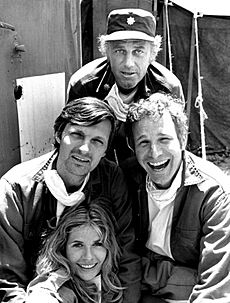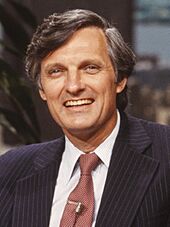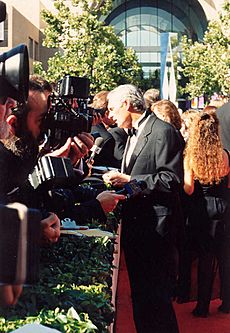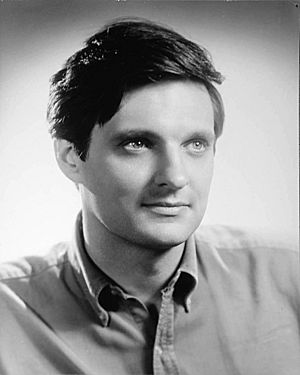Alan Alda facts for kids
Quick facts for kids
Alan Alda
|
|
|---|---|
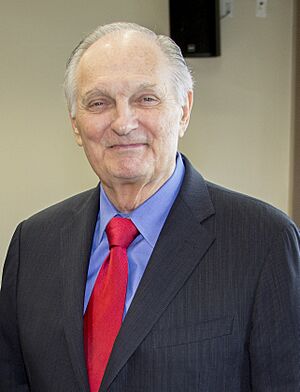
Alda in 2015
|
|
| Born |
Alphonso Joseph D'Abruzzo
January 28, 1936 New York City, U.S.
|
| Education | Fordham University (BA) |
| Occupation |
|
| Years active | 1955–present |
| Spouse(s) | |
| Children | 3, including Beatrice Alda |
| Parent(s) |
|
| Relatives | Antony Alda (half-brother) |
| Awards | Full list |
Alan Alda (born Alphonso Joseph D'Abruzzo on January 28, 1936) is a famous American actor, writer, and director. He has won six Emmy Awards and six Golden Globe Awards. He is most famous for playing Captain Benjamin "Hawkeye" Pierce in the TV show M*A*S*H, which was on from 1972 to 1983. He also wrote and directed many episodes of the show.
Alda has also starred in many movies. He was nominated for an Academy Award for Best Supporting Actor for the 2004 film The Aviator. Some of his other well-known films include Crimes and Misdemeanors (1989), Flirting with Disaster (1996), Bridge of Spies (2015), and Marriage Story (2019).
On television, Alda won an Emmy for his role as Senator Arnold Vinick in The West Wing. He has also appeared in shows like ER, 30 Rock, and The Blacklist. Besides acting, Alda is known for his work on Broadway and received three Tony Award nominations. In 2019, he was given the Screen Actors Guild Life Achievement Award for his long and successful career.
Early Life and Schooling
Alan Alda was born in Manhattan, New York City. His birth name was Alphonso Joseph D'Abruzzo. As a child, he traveled across the United States with his parents because his father was a performer. His father, Robert Alda, was an actor and singer of Italian descent. His mother, Joan Browne, was a former beauty-pageant winner of Irish descent.
His childhood had challenges. His mother had a serious mental illness, which made life at home unpredictable. Alda said this taught him how to react quickly to different situations, a skill that helped him later as an actor. When he was seven, he got polio, a serious disease. His parents used a treatment that involved wrapping his arms and legs in hot wool blankets and stretching his muscles.
Alda went to Archbishop Stepinac High School in White Plains, New York. He later studied English at Fordham University. During college, he studied abroad in Paris and acted in a play in Rome. After graduating in 1956, he joined the United States Army Reserve for six months.
Acting Career
Early Work on Stage and Screen
Alda started his career in the 1950s with comedy groups like the Compass Players and Second City. In 1961, he acted on Broadway in the play Purlie Victorious. In 1964, he starred in The Owl and The Pussycat on Broadway. His co-star was Diana Sands, an African-American actress. Their on-stage kiss was controversial at the time and some people sent angry letters.
He made his first movie appearance in Gone Are the Days!, a film version of the play Purlie Victorious. He also appeared in other movies like Paper Lion (1968). During this time, he was a regular guest on TV game shows like What's My Line?.
M*A*S*H and Rise to Fame
In 1972, Alda was cast as Hawkeye Pierce in the TV show M*A*S*H. The show was about army doctors during the Korean War. It became incredibly popular, and Alda was the only actor to appear in all 256 episodes. He won five Emmy Awards for his work on the show. He also wrote 19 episodes and directed 32, including the final episode, "Goodbye, Farewell and Amen". This finale was one of the most-watched television episodes in history.
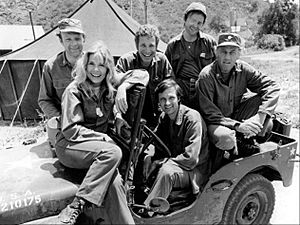
For 11 years, Alda flew from Los Angeles to his home in New Jersey every weekend to be with his family. He didn't want to move them to California because he wasn't sure how long the show would last.
As the show went on, Alda gained more creative control. The show started as a comedy but later began to explore more serious topics about war and politics. Some people divide the show's history into the "comedy" years and the "dramatic" years, which were more influenced by Alda.
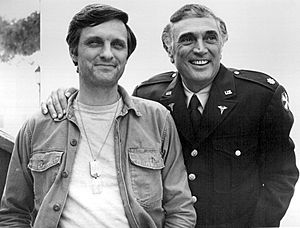
During his time on M*A*S*H, Alda also starred in movies like Same Time, Next Year (1978) and California Suite (1978).
Career After M*A*S*H
After M*A*S*H ended in 1983, Alda continued to act, write, and direct. He wrote and directed the popular 1981 film The Four Seasons. He often appeared in movies by director Woody Allen, such as Crimes and Misdemeanors (1989) and Manhattan Murder Mystery (1993).
From 1993 to 2005, Alda hosted the TV show Scientific American Frontiers, which explored new discoveries in science and technology. In 1999, he had a guest role on the medical drama ER as a doctor with early-stage Alzheimer's disease. His performance earned him an Emmy nomination.
Recent Roles and Achievements
From 2004 to 2006, Alda played Senator Arnold Vinick on the TV show The West Wing. He won an Emmy Award for this role. In 2004, he played Senator Owen Brewster in the movie The Aviator, which earned him an Academy Award nomination.
He has continued to act in movies like Tower Heist (2011), Bridge of Spies (2015), and Marriage Story (2019). For Marriage Story, he received great reviews for his role as a kind lawyer. He also appeared in the web series Horace and Pete in 2016.
In 2025, Alda appeared in a new Netflix version of The Four Seasons, the movie he originally directed and starred in back in 1981.
Charity and Science Communication
Alda has been very involved in charity work, especially for St. Jude Children's Research Hospital. He is also passionate about helping scientists communicate better with the public. For 14 years, he hosted Scientific American Frontiers.
In 2009, he helped start the Alan Alda Center for Communicating Science at Stony Brook University. The center teaches scientists how to explain their work in a clear and engaging way. For his work, he has received many awards, including the National Academy of Sciences Public Welfare Medal in 2016.
Personal Life
In 1956, Alda met Arlene Weiss. They met at a dinner party where a rum cake fell on the floor, and they were the only two people who ate it anyway. They married a year later on March 15, 1957. They have three daughters.
Alda has written three books about his life, called memoirs. They are:
- Never Have Your Dog Stuffed: and Other Things I've Learned (2005)
- Things I Overheard While Talking to Myself (2008)
- If I Understood You, Would I Have This Look on My Face? (2017)
On July 31, 2018, Alda announced that he had been diagnosed with Parkinson's disease three years earlier. He continues to act and work while managing the illness.
Awards and Recognition
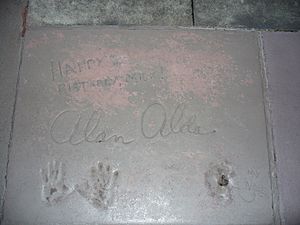
Alan Alda has won many awards for his work in television, film, and theater. These include six Primetime Emmy Awards and six Golden Globe Awards. He has also been nominated for an Academy Award, a Grammy Award, and three Tony Awards.
In 1994, he was added to the Television Hall of Fame. In 2018, he received the Screen Actors Guild Life Achievement Award, one of the highest honors for an actor.
Images for kids
-
Alan and Robert Alda in 1975
-
Alda's handprints and noseprint at Disney's Hollywood Studios
See also
 In Spanish: Alan Alda para niños
In Spanish: Alan Alda para niños


